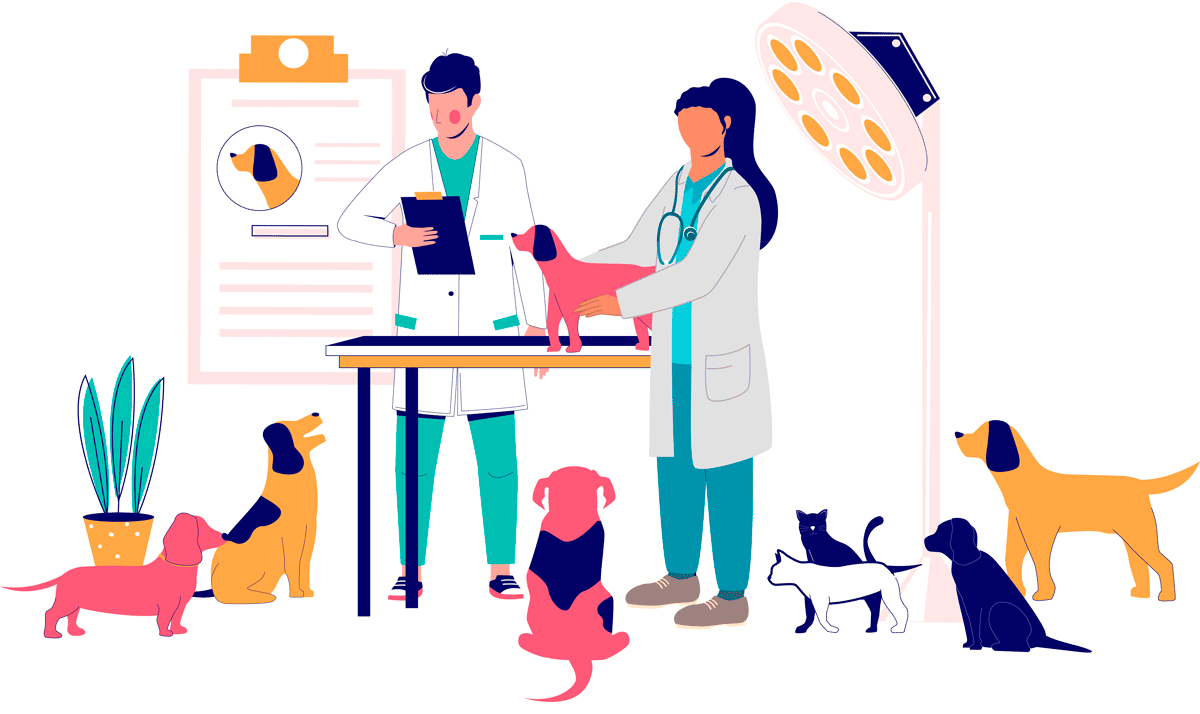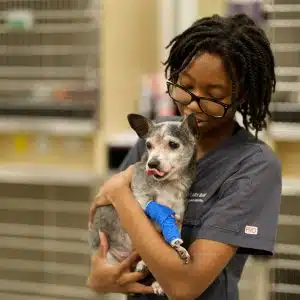Key questions your Board Certified Veterinary Oncologist at the first appointment
Wiki Article
Comprehensive Guide to the Solutions Provided by a Vet Oncologist
Vet oncology includes a large range of services focused on dealing with and detecting cancer cells in family pets. Veterinary Oncologist. Oncologists employ advanced diagnostic strategies and supply various therapy alternatives customized to every animal's requirements. They likewise prioritize supportive treatment and supply useful sources for family pet owners. Understanding these services is crucial for making informed choices. What details elements of veterinary oncology can notably influence a pet dog's therapy journey?Recognizing Vet Oncology
Veterinary oncology is a specialized area concentrated on treating and diagnosing cancer in pets. This self-control encompasses a variety of strategies, from medical therapies such as chemotherapy and immunotherapy to medical interventions focused on removing lumps. Vet oncologists are trained to recognize the one-of-a-kind indications of cancer cells in various types, enabling them to tailor therapy strategies to individual people.Along with traditional treatments, vet oncology highlights encouraging care, which plays an essential function in improving the lifestyle for affected pets. This consists of pain monitoring, nutritional assistance, and palliative treatment options. Partnership with pet dog owners is crucial, as they are important to decision-making concerning their pets' treatment courses. As study developments, vet oncology continues to develop, using brand-new hope and enhanced end results for pets diagnosed with cancer. On the whole, this field is essential for attending to the complexities of cancer in buddy pets.
Advanced Diagnostic Techniques
Advanced diagnostic methods play a crucial duty in vet oncology, supplying important insights into the presence and degree of cancer in animals. Imaging modalities such as ultrasound, CT scans, and MRI are commonly utilized to imagine tumors and examine their features. In addition, biopsy treatments are very important for obtaining cells examples, enabling conclusive diagnosis and tailored treatment plans.Imaging Modalities Utilized
Imaging methods play an important role in the medical diagnosis and administration of cancer cells in animals. Vet oncologists make use of different innovative imaging strategies to analyze lump dimension, existence, and metastasis. Radiography, or X-rays, offers an initial view of bone and upper body problems, while ultrasound provides real-time imaging of soft cells, enabling for detailed analysis of interior organs. Calculated tomography (CT) enhances visualization of intricate anatomical frameworks and enables 3D repairs, helping in accurate lump localization. Magnetic resonance imaging (MRI) is important for soft cells distinction, particularly in mind lumps. Furthermore, nuclear medication techniques such as positron exhaust tomography (ANIMAL) aid identify metabolic task within lumps. Collectively, these techniques improve diagnostic accuracy, leading effective therapy strategies for oncological people.Biopsy Procedures Discussed
Adhering to the preliminary assessment with imaging techniques, getting a definitive diagnosis commonly calls for tissue sampling with biopsy treatments. Vet oncologists utilize different biopsy methods based upon the lump's location and attributes. Fine needle goal (FNA) is a minimally invasive technique that draws out cells for cytological exam, perfect for surface masses. Core needle biopsies give larger tissue samples and are valuable for much deeper lumps, permitting histopathological analysis. Surgical biopsies involve excising a section or the whole lump, helping with detailed analysis. These treatments not only confirm the presence of cancer but also aid establish its type and quality, guiding therapy choices. Each biopsy strategy is selected thoroughly to stabilize analysis precision with person safety and security and convenience.Treatment Alternatives for Cancer in Pet dogs
When an animal is detected with cancer, a selection of treatment alternatives end up being readily available to help enhance and take care of the disease high quality of life. Vet oncologists generally advise a multidisciplinary approach tailored to the specific pet's requirements, which might consist of surgical procedure, radiation treatment, immunotherapy, or alternate treatments.Surgical treatment is frequently utilized to get rid of tumors and afflicted tissues, potentially bring about full remission in some cases. Radiation therapy intends to damage and target cancer cells, reducing tumor size and relieving symptoms - Pet Cancer Surgery. Immunotherapy utilizes the family pet's body immune system to battle cancer a lot more successfully, while different treatments could consist of acupuncture or organic supplements to sustain general wellness
Each therapy choice brings its own benefits and threats, and veterinary oncologists function very closely with pet dog proprietors to create a detailed strategy that straightens with the family pet's certain diagnosis and the owner's desires. The utmost goal is to enhance the pet dog's convenience and lifestyle throughout their cancer journey.
Chemotherapy for Animals
Radiation treatment is a typical treatment alternative for pets diagnosed with cancer cells and is usually utilized together with various other treatments laid out by veterinary oncologists. This therapy includes the administration of details medicines made to destroy and target cancer cells, therefore minimizing tumor dimension and stopping the spread of the illness. Vet oncologists tailor radiation treatment procedures based upon the kind of cancer, the pet's general health, and the preferred treatment result.Negative effects can occur, as these medications might also impact healthy cells. Typical reactions include nausea or vomiting, vomiting, and momentary changes in cravings - Veterinary Oncology Services. Vet oncologists are geared up to handle these adverse effects efficiently, ensuring the family pet's convenience throughout the treatment process. Normal monitoring through blood tests and follow-up visits is vital to evaluate the pet dog's response to chemotherapy and make needed changes. Inevitably, chemotherapy can supply substantial advantages, boosting the quality of life for pets dealing with cancer medical diagnoses

Radiation Therapy in Veterinary Medicine
Radiation treatment works as an effective treatment option for pet dogs detected with localized lumps, providing a targeted method to cancer cells monitoring. This strategy makes use of high-energy radiation to harm the DNA of cancer cells, hindering their capacity to multiply. It is specifically advantageous for growths that are not open to surgical removal or for cases where surgical treatment might not be practical because of the growth's location.Veterinary oncologists customize radiation methods based upon growth place, type, and size, as well as the animal's overall wellness. Therapy can be provided via exterior light beam radiation or brachytherapy, each with distinctive benefits. Commonly, several sessions are needed to make the most of efficiency while decreasing negative effects.
Family pets may experience momentary reactions such as skin irritability, the general purpose is to diminish lumps and minimize signs and symptoms, eventually boosting the animal's diagnosis and quality of life. Appropriately, radiation treatment plays a necessary duty in complete cancer care.
Palliative Treatment and Quality of Life
Palliative care in vet oncology concentrates on enhancing the high quality of life for pet dogs facing terminal health problems, ensuring comfort and self-respect in their last days. This customized method focuses on discomfort monitoring, symptom control, and emotional support. Veterinary oncologists analyze each pet's individual needs, tailoring interventions to ease discomfort and improve general wellness.Methods might consist of administering medications for pain relief, managing nausea, and attending to various other traumatic signs and symptoms. Additionally, dietary assistance is frequently supplied to preserve stamina and improve hunger. The emotional aspect of palliative treatment is just as vital; developing a tranquil setting assists minimize stress and anxiety for both animal and owner.
Eventually, the goal of palliative care is to permit pet dogs to enjoy their remaining time with as much joy and self-respect as feasible. By focusing on comfort and quality of life, vet oncologists play an essential duty in making sure that family pets and their families browse this tough journey with empathy and understanding.
Assistance for Animal Owners Throughout Treatment

Psychological Assistance for Proprietors
Charting the emotional landscape throughout a pet's cancer cells treatment can be a frustrating experience for owners. The uncertainty bordering diagnosis and diagnosis can lead to feelings of unhappiness, vulnerability, and anxiety. Vet oncologists recognize the significance of psychological assistance and frequently supply guidance to assist proprietors navigate this hard trip. Interaction is necessary; talking about therapy alternatives and possible end results can reduce some anxieties. Additionally, offering reassurance that emotional reactions are legitimate fosters a helpful setting. Several oncology clinics may also suggest support teams or therapy solutions tailored for family pet proprietors, assisting in shared experiences. Encouraging owners to focus on self-care throughout this moment is essential, as their psychological health straight influences their animal's convenience and general therapy experience.
Resources and Educational Products
Steering via the intricacies of a family pet's cancer therapy can be daunting for owners, making accessibility to trustworthy resources and instructional products necessary. Veterinary oncologists usually give a variety of handouts, brochures, and online products that explain treatment check that alternatives, prospective adverse effects, and care strategies. These resources aid demystify the procedure and empower pet dog owners to make educated choices. Additionally, lots of oncology facilities provide accessibility to support forums and groups where proprietors can get in touch browse around these guys with others dealing with similar obstacles, promoting a feeling of area. Educational webinars and seminars carried out by vet professionals additionally boost understanding, ensuring that owners are fully equipped to browse their pet dog's trip via cancer therapy with self-confidence and understanding.Often Asked Inquiries
Exactly How Can I Prepare My Family Pet for a Vet Oncology Visit?
Preparing an animal for a veterinary oncology visit involves gathering medical records, noting signs, and making sure the pet dog fits. A calm behavior and familiar items can help ease anxiety during the appointment.What Are the Signs My Pet May Have Cancer?
Indicators that a pet dog might have cancer cells include unusual fat burning, relentless throwing up or diarrhea, unusual lumps or swellings, sleepiness, modifications in hunger, difficulty breathing, and alterations in actions. Trigger veterinary interest is crucial.Just How Can I Support My Pet Emotionally Throughout Treatment?
Sustaining an animal emotionally throughout treatment involves supplying comfort, maintaining regimens, providing gentle love, and guaranteeing a calm atmosphere. Taking part in silent play and routine friendship assists reduce stress and promotes a sense of protection.Are There Alternative Treatments for Animals With Cancer cells?
Alternative treatments for pet dogs with cancer consist of acupuncture, herbal therapies, and nutritional assistance. These approaches may enhance conventional therapies, promoting general health. Consulting with a veterinarian is crucial for risk-free and reliable assimilation of alternative treatments.What Prices Should I Anticipate for Veterinary Oncology Solutions?
The awaited costs for veterinary oncology solutions can vary significantly, usually influenced by diagnostics, treatments, and continuous treatment. Pet proprietors must plan for costs ranging from consultations to specialized treatments, mirroring the intricacy of cancer management.Collaboration with family pet proprietors is important, as they are indispensable to decision-making concerning their pets' treatment paths. Each therapy option carries its very own benefits and risks, and vet oncologists function very closely with pet dog proprietors to make an extensive plan that lines up with the animal's certain diagnosis and the owner's dreams. Pet dogs might experience momentary responses such as skin inflammation, the general objective is to shrink tumors and alleviate symptoms, inevitably boosting the family pet's prognosis and quality of life. Assistance for pet dog owners during therapy is essential in guiding with the emotional obstacles connected with an animal's cancer medical diagnosis. Preparing a family pet for a veterinary sites oncology go to entails event medical documents, keeping in mind symptoms, and ensuring the pet dog is comfortable.
Report this wiki page